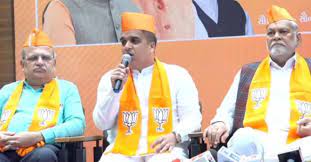Gujarat Government Set Up Committee To Implement Uniform Civil Code(UCC)

Gujarat Government Set Up Committee To Implement Uniform Civil Code(UCC): Going to the Gujarat Assembly polls and waiting for the election schedule to be released, state home minister Harsh Sanghvi announced that the cabinet has decided to set up a committee to implement the Uniform Civil Code (UCC) in the state.
October 2022 Current Affairs Quiz
A Recent Phenomena:
Gujarat is the second BJP-ruled state after Uttarakhand to constitute a committee of experts on the UCC. The Chief Ministers of BJP-ruled Himachal Pradesh and Assam have also supported the UCC’s proposal.
What Has Been Said:
Addressing a press conference in Gandhinagar, Union Minister Parshottam Rupala said, “From the days of our youth, we have been making demand for Ram Janmabhoomi, for (abrogation of) Article 370, for UCC. I want to congratulate and express my gratitude to Chief Minister Bhupendra Pate, he has taken the next step towards fulfilling an old demand of the BJP.” “Like Ram Mandir and Kashmir, this issue (of UCC) has been passed by the Gujarat government (in the cabinet). A committee will be formed soon and based on the committee’s report, the way for implementing this law will open up in the state of Gujarat.”
About The Committee:
The committee will be constituted under the leadership of a retired judge of the High Court. The Cabinet has empowered the Chief Minister to form the committee and it is likely to consist of three or four members. The scope of its work will also be decided.
Earlier Approach:
Since, family and succession laws come under the concurrent jurisdiction of the Centre and states, a state government can bring in a state law. But a uniform law across the country can only be enacted by Parliament. Earlier this month, the Center had told the Supreme Court that the matter would now be referred to the 22nd Law Commission.
Responding to petitions seeking uniformity in laws governing matters of divorce, succession, inheritance, adoption and guardianship, the Centre, in an affidavit, underlined that the Constitution obligates the state to have a Uniform Civil Code for citizens. It said citizens belonging to different religions and denominations following different property and matrimonial laws “is an affront to the nation’s unity”.
The government also told the Supreme Court that it cannot issue any direction to the legislature to enact any particular law. “This is a matter of policy for the elected representatives of the people to decide. It is for the legislature to enact or not to enact a legislation,” its affidavit stated.
The Prevailing Condition:
Article 44 of the Constitution – in Part IV which deals with Directive Principles of State Policy – states: “The State shall endeavour to secure for the citizens a uniform civil code throughout the territory of India.”
Goa is the only state in India that has a uniform civil code regardless of religion, gender and cast. A former Portuguese colony, it inherited the Portuguese Civil Code, 1867 that is still applicable in the state even after it joined the Indian Union in 1961.
Different personal laws are applied to other religious communities in other parts of the country. For instance, the Hindu Marriage Act, 1955 is applicable to Hindus, Buddhists, Jains and Sikhs, the Parsi Marriage and Divorce Act, 1936 is applicable to matters related to Parsis, the Indian Christian Marriage Act, 1872 for Christians and the Muslim Personal Law (Shariat) Application Act, 1937 is applicable to Muslims in personal matters.